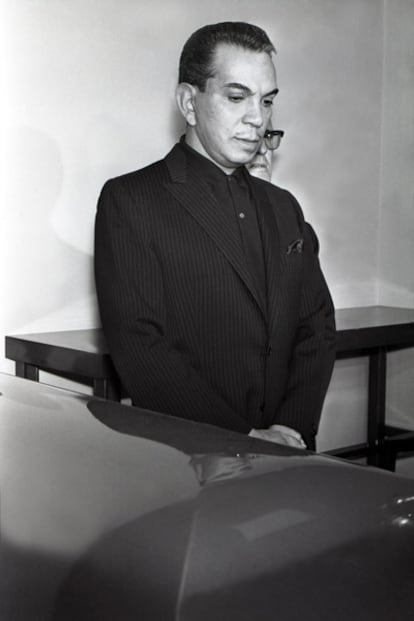Remembering Cantinflas: the Latin Charlie Chaplin at 100
Mexico remembers national celebrity's talent in a nostalgic atmosphere
Latin America's Charlie Chaplin, Mexican comic Cantinflas, would have turned 100 years old on August 12. Adored throughout the Spanish-speaking world, Cantinflas' frenetic brand of slapstick was, like Chaplin's, as balletic as it was athletic. His ability to combine humor with pathos was also Chaplinesque. But Cantinflas' more than four decades at the top was not down to imitation.
Born Mario Moreno Reyes the year after the Mexican Revolution, he was the sixth of 12 children and grew up in one of the capital's toughest neighborhoods, Tepito. At 16, he falsified his papers and enlisted in the army, but was thrown out when discovered. He then tried to enter the United States, but was turned back. His career in show business began by singing and dancing in traveling tent variety shows known as carpas. He soon gained a large following as a circus clown and acrobat and then became a bullfighter/bullring clown- the Mexican equivalent of an American rodeo clown, who distracts the bulls to help out performers in trouble. Back in the carpas he tried to imitate Al Jolson by smearing his face with black paint. But his future was secured once he embraced his own Latin heritage as a lowly peladito, or slum dweller, a tiny mustache at the ends of his lip, a jaunty cap over his mussed black hair, a grubby vest and a rope for a belt.
He would famously wriggle out of trouble with the authorities by overwhelming them with machine-gun speed monologues that, while sounding gloriously informed, signified absolutely nothing. The Spanish Royal Academy of Language would later admit the verb cantinflear in recognition of his contribution.
Cantinflas made his movie debut in 1936 with No te engages corazón and 49 more films followed. His humor is deeply rooted in Spanish and Mexican culture; this, combined with his unique patter, did not translate well to non-Spanish-speaking audiences, although he will be remembered for his role as Passepartout, loyal valet of Phileas Fogg, in the 1956 hit Around the World in Eighty Days.
He did not make another Hollywood film until 1960's notorious box-office bomb Pepe. After that rare failure, Cantinflas returned to making Spanish-language films. Following his retirement in the late 1960s, Cantinflas devoted his life to helping others, particularly children, through humanitarian organizations. In 1988, he received a lifetime achievement award from the Mexican Academy of Cinema. In 1993, shortly before his death from lung cancer, Cantinflas was named a "symbol of peace and happiness of the Americas."
Unlike Chaplin, whose politicized approach in films such as Modern Times and overt lack of respect- on screen and off-screen- for the authorities got him into trouble, Cantinflas never really challenged the status quo in a Mexico run as a quasi-dictatorship by the PRI, the Institutional Revolutionary Party. Writer Jorge Castañeda in his El misterio de los mexicanos (The mystery of the Mexicans) describes Cantinflas as "typically Mexican" in his approach to life. "He is the most extraordinary example of the Mexican who systematically avoids confrontation."

Tu suscripción se está usando en otro dispositivo
¿Quieres añadir otro usuario a tu suscripción?
Si continúas leyendo en este dispositivo, no se podrá leer en el otro.
FlechaTu suscripción se está usando en otro dispositivo y solo puedes acceder a EL PAÍS desde un dispositivo a la vez.
Si quieres compartir tu cuenta, cambia tu suscripción a la modalidad Premium, así podrás añadir otro usuario. Cada uno accederá con su propia cuenta de email, lo que os permitirá personalizar vuestra experiencia en EL PAÍS.
¿Tienes una suscripción de empresa? Accede aquí para contratar más cuentas.
En el caso de no saber quién está usando tu cuenta, te recomendamos cambiar tu contraseña aquí.
Si decides continuar compartiendo tu cuenta, este mensaje se mostrará en tu dispositivo y en el de la otra persona que está usando tu cuenta de forma indefinida, afectando a tu experiencia de lectura. Puedes consultar aquí los términos y condiciones de la suscripción digital.








































